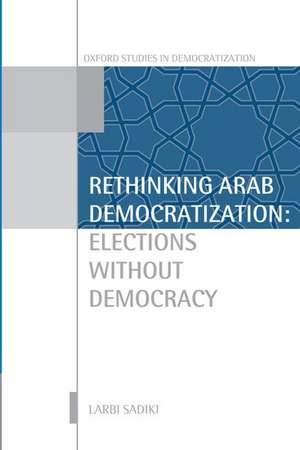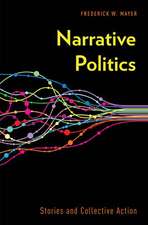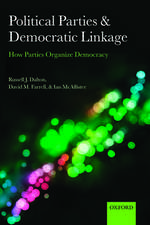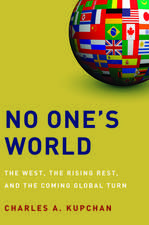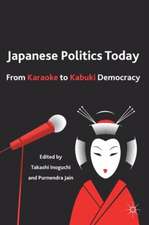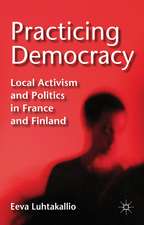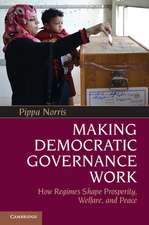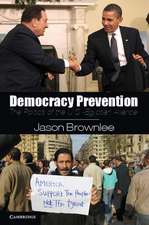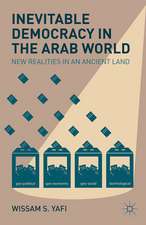Rethinking Arab Democratization: Elections without Democracy
Autor Larbi Sadikien Limba Engleză Paperback – 10 noi 2011
| Toate formatele și edițiile | Preț | Express |
|---|---|---|
| Paperback (1) | 308.83 lei 31-38 zile | |
| Oxford University Press – 10 noi 2011 | 308.83 lei 31-38 zile | |
| Hardback (1) | 747.02 lei 31-38 zile | |
| OUP OXFORD – 12 feb 2009 | 747.02 lei 31-38 zile |
Preț: 308.83 lei
Preț vechi: 334.97 lei
-8% Nou
Puncte Express: 463
Preț estimativ în valută:
59.09€ • 61.70$ • 48.91£
59.09€ • 61.70$ • 48.91£
Carte tipărită la comandă
Livrare economică 24-31 martie
Preluare comenzi: 021 569.72.76
Specificații
ISBN-13: 9780199699247
ISBN-10: 0199699240
Pagini: 348
Dimensiuni: 157 x 234 x 27 mm
Greutate: 0.54 kg
Editura: Oxford University Press
Colecția OUP Oxford
Locul publicării:Oxford, United Kingdom
ISBN-10: 0199699240
Pagini: 348
Dimensiuni: 157 x 234 x 27 mm
Greutate: 0.54 kg
Editura: Oxford University Press
Colecția OUP Oxford
Locul publicării:Oxford, United Kingdom
Recenzii
Review from previous edition This impressive book offers a probing analysis of Arab electoralism as part of a penetrating larger critique of the applicability of Western democratic 'transitology' to the Arab world. Employing an effective blend of scholarly research and practical political insights, Sadiki presents a useful alternative lens that is true to local realities without sacrificing core democratic ideals.
This is an invaluable, empirically rich exploration of the pitfalls, detours and dead-ends on the variety of paths that may lead to democratization in the Arab world, or may not. If Larbi Sadiki reveals a residual optimism about the future, it is only after he has presented an exhaustive examination of the manoeuvres and barriers that Arab political elites deploy to sustain privilege and stifle freedom. Larbi Sadiki reveals an informed empathy for the dynamic non-elite social and political forces that seek greater freedom and greater justice. He is perceptive, thoughtful and persuasive, which is why his book will quickly be recognized as the indispensible and authoritative volume to read on the topic.
The author combines to great advantage a close and critical familiarity with the politics of the Arab Middle East and Islamic culture with equally close knowledge of the relevant Western democratization literature. The result is a remarkable book that greatly advances our knowledge of those countries and of their -- surely convoluted but not inexistent -- possible paths toward democracy.
This is an invaluable, empirically rich exploration of the pitfalls, detours and dead-ends on the variety of paths that may lead to democratization in the Arab world, or may not. If Larbi Sadiki reveals a residual optimism about the future, it is only after he has presented an exhaustive examination of the manoeuvres and barriers that Arab political elites deploy to sustain privilege and stifle freedom. Larbi Sadiki reveals an informed empathy for the dynamic non-elite social and political forces that seek greater freedom and greater justice. He is perceptive, thoughtful and persuasive, which is why his book will quickly be recognized as the indispensible and authoritative volume to read on the topic.
The author combines to great advantage a close and critical familiarity with the politics of the Arab Middle East and Islamic culture with equally close knowledge of the relevant Western democratization literature. The result is a remarkable book that greatly advances our knowledge of those countries and of their -- surely convoluted but not inexistent -- possible paths toward democracy.
Notă biografică
Larbi Sadiki specializes on Arab democratization, a subject he teaches at the University of Exeter, where he is Director of the Middle East Politics Programme. He has published widely on the question of democratic transitions in the Arab Middle East. He has been researching two separate projects on Islamist notions of democracy, with special reference to Hamas and Hizbullah, titles of forthcoming works he is currently authoring. His first book on Arab democratization (Columbia, 2004) has been translated into Arabic and is widely used as the key reference on notions of Arab democracy.
